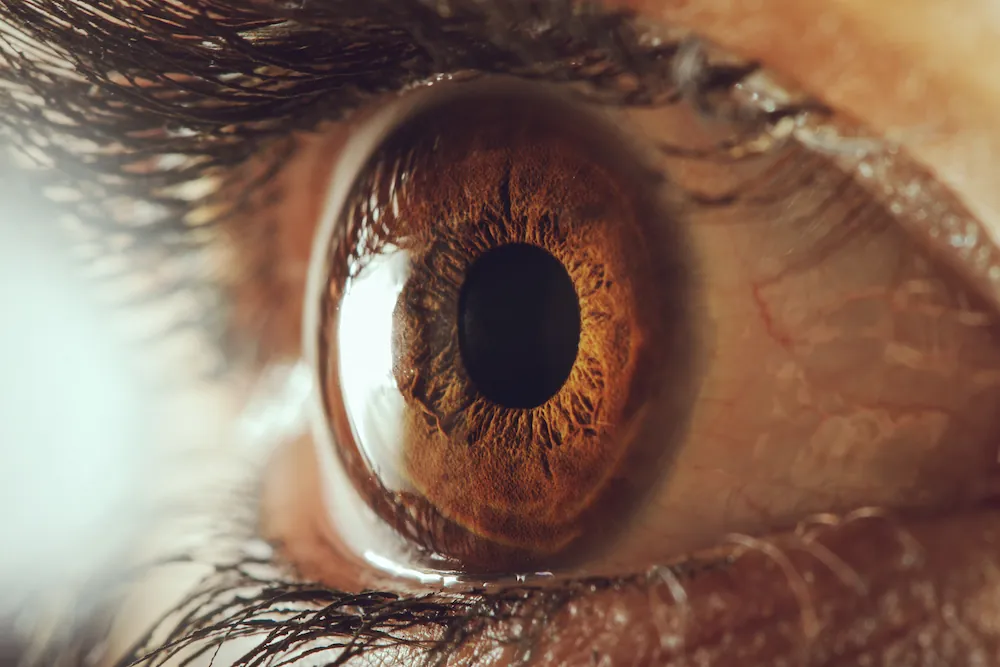Cornea
The eye has many important parts, including the cornea. Read on to find out how the cornea helps you see and what conditions can affect the cornea.
What is the cornea?
The cornea is the outermost part of the front of the eye. It is clear and has a dome shape. If you see an illustration of the eye, it looks like a contact lens. The cornea helps focus vision and works with the lens in your eye to focus light on the retina. The retina is on the inside, on the back of your eyeball. It converts light into nerve signals, which it sends to your brain through the optic nerve.

What is the cornea made of?
The cornea has several layers of special kinds of tissues. Unlike other parts of your body, there are no blood vessels in the cornea. The cornea has to remain clear so you can see. Each layer of the cornea has a specific role. The outer layer protects the cornea and transports nutrients to the rest of the cornea. It has a smooth surface that helps light focus. The outer layer also has thousands of nerve endings, which is why you feel pain when dust gets in your eye. Other layers help the cornea to heal and provides structure and form for the cornea. The back layers protect against infection and help maintain the balance of fluids. The right balance of fluids helps keep the cornea clear and functioning correctly.
How is the cornea important to vision?
The cornea helps focus the light that enters your eye. More than two-thirds of your eye’s focusing power comes from the cornea. The cornea’s job is to bend the light that enters your eyes, so it reaches the lens. Bending light like this is called refraction. The lens then transmits the light to the retina, which sends impulses to the brain. The brain interprets the images so that you can see.
Can the cornea get injured?
The cornea can get injured or scratched. If the injury or scratch isn’t very serious, the cornea usually heals itself. With more serious injuries, you should see an eye doctor. Symptoms of serious corneal injuries include pain and redness in the eye, blurred vision, and light sensitivity.
What other problems can affect the cornea?
If you are allergic to pollen, you may experience symptoms in your eyes. Allergies can cause your eyes to itch, burn, sting, tear up or release a watery discharge. Eye dryness also affects the cornea. In this condition, your eye can’t produce enough tears to keep the surface of the eye wet. This may make your eye feel scratchy or cause pain and redness. Corneal dystrophy is a condition where material builds up in the eye. This can cause the cornea to become cloudy, impairing vision. There are several types of dystrophies that can affect your eye. The cornea can also be affected by infections such as shingles and herpes. Your eye doctor may prescribe antiviral drugs if you get one of these infections.
What is keratoconus?
Keratoconus is when the cornea thins out and bulges like a cone. Changing the shape of the cornea brings light rays out of focus. As a result, your vision is blurry and distorted, making daily tasks like reading or driving difficult.
What are cornea transplants for?
Cornea transplants are commonly used for conditions like keratoconus. This is only necessary if the cornea becomes seriously damaged. During a cornea transplant, the surgeon removes the cornea and replaces it with a cornea from a donor. If the entire cornea is removed and replaced with a donor cornea, it’s called a full-thickness transplant. This kind of transplant is for when the cornea has severe scarring or a serious injury. Often, the surgeon will only remove and replace the outer, diseased layers of the cornea. This is a partial thickness transplant. Doctors prefer to leave the healthy layers of the cornea intact when possible. This results in better improvement of vision and keeps the corneal structure stronger.

Get started on your path to better healthy vision with our Cornea Specialists.
We have four convenient locations in Illinois: Elmhurst, Naperville, South Barrington, and Lincolnwood. Schedule an appointment today by calling us at 630-318-4925 or request an appointment online.
The doctors at Kovach Eye Institute have either authored or reviewed and approved this content.
Page Updated:

